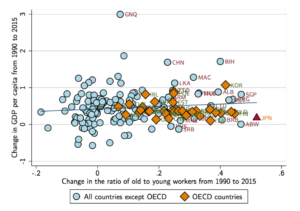That’s what Daron Acemoglu and Pascual Restrepo document in an NBER working paper. Figure 2 [below] provides a glimpse of the relevant pattern by depicting the raw correlation between the change in GDP per capita between 1990 and 2015 and the change in the ratio of the population above 50 to the population between the ages of 20 and 49. … even when we control for initial GDP per capita, initial demographic composition and differential trends by region, there is no evidence of a negative relationship between aging and GDP per capita; on the contrary, the relationship is significantly positive in many specifications. In an article published in 2012 with Martín Gonzalez-Eiras (see also the VoxEU column), we provide a theory that can account for this finding.
Topics:
Dirk Niepelt considers the following as important: Ageing, Contributions, Demographics, growth, Notes
This could be interesting, too:
Dirk Niepelt writes Does the US Administration Prohibit the Use of Reserves?
Dirk Niepelt writes “Pricing Liquidity Support: A PLB for Switzerland” (with Cyril Monnet and Remo Taudien), UniBe DP, 2025
Dirk Niepelt writes “Report by the Parliamentary Investigation Committee on the Conduct of the Authorities in the Context of the Emergency Takeover of Credit Suisse”
Dirk Niepelt writes “Governments are bigger than ever. They are also more useless”
That’s what Daron Acemoglu and Pascual Restrepo document in an NBER working paper.
Figure 2 [below] provides a glimpse of the relevant pattern by depicting the raw correlation between the change in GDP per capita between 1990 and 2015 and the change in the ratio of the population above 50 to the population between the ages of 20 and 49. … even when we control for initial GDP per capita, initial demographic composition and differential trends by region, there is no evidence of a negative relationship between aging and GDP per capita; on the contrary, the relationship is significantly positive in many specifications.
In an article published in 2012 with Martín Gonzalez-Eiras (see also the VoxEU column), we provide a theory that can account for this finding.

